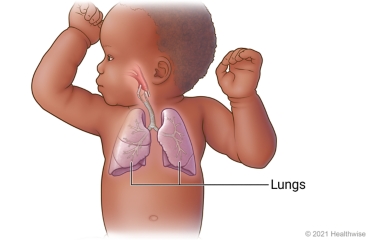What is RSV?

RSV is short for respiratory syncytial virus infection. It causes the same symptoms as a bad cold. And like a cold, it is very common and spreads easily. Most children have had it at least once by age 2.
There are many kinds of RSV, so your child's body never becomes immune to it. Your child can get it again and again, sometimes during the same season.
What happens when your child has RSV?
RSV attacks your child's nose, eyes, throat, and lungs. It spreads when your child coughs, sneezes, or shares food or drinks.
RSV can make it hard for a child to breathe. It is important to watch the symptoms, especially in babies.
What are the symptoms?
Symptoms of RSV include:
- A cough.
- A stuffy or runny nose.
- A mild sore throat.
- An earache.
- A fever.
Babies with RSV may also have no energy, act fussy or cranky, and be less hungry than usual. Some children have more serious symptoms, like wheezing or trouble breathing. Call your doctor if your child is wheezing or having trouble breathing.
How can you prevent RSV infection?
It is very hard to keep from catching RSV, just like it is hard to keep from catching a cold. But you can lower the chances by practicing good health habits. Wash your hands often, and teach your child to do the same.
There are two immunization options recommended to protect all babies from severe RSV. Only one of these options is usually needed for most babies to be protected:
- The RSV vaccine given during 32 to 36 weeks of pregnancy and right before or during RSV season. Immunity is then passed to the baby during pregnancy.
- RSV antibodies given to babies who are younger than 8 months and born during or at the start of RSV season. RSV antibodies may also be advised for some babies and young children ages 8 to 19 months who are at increased risk for severe RSV.
You can talk with your child's doctor about which option may be best for you and your baby.
How is RSV treated?
Home treatment is usually all that is needed:
- Use saline drops to thin mucus. Suction your baby's nose if your baby can't breathe well enough to eat or sleep.
- Give your child acetaminophen (Tylenol) or ibuprofen (Advil, Motrin) for fever. Do not use ibuprofen if your child is less than 6 months old unless the doctor gave you instructions to use it. Be safe with medicines. Read and follow all instructions on the label. Do not give aspirin to children and teens. It has been linked to Reye syndrome, a rare but serious illness.
- Give your child lots of fluids. This is very important if your child is vomiting or has diarrhea. Give your child sips of water or drinks such as Pedialyte or Infalyte. These drinks contain a mix of salt, sugar, and minerals. You can buy them at drugstores or grocery stores. Give these drinks as long as your child is throwing up or has diarrhea. Do not use them as the only source of liquids or food for more than 12 to 24 hours.
When a child with RSV is otherwise healthy, symptoms usually get better in a week or two.
Follow-up care is a key part of your child's treatment and safety. Be sure to make and go to all appointments, and contact your doctor if your child is having problems. It's also a good idea to know your child's test results and keep a list of the medicines your child takes.
Where can you learn more?
Go to http://www.healthwise.net/patientEd
Enter P843 in the search box to learn more about "Learning About RSV Infection in Children".
Current as of: October 24, 2024
Author: Ignite Healthwise, LLC Staff
Clinical Review Board
All Ignite Healthwise, LLC education is reviewed by a team that includes physicians, nurses, advanced practitioners, registered dieticians, and other healthcare professionals.

